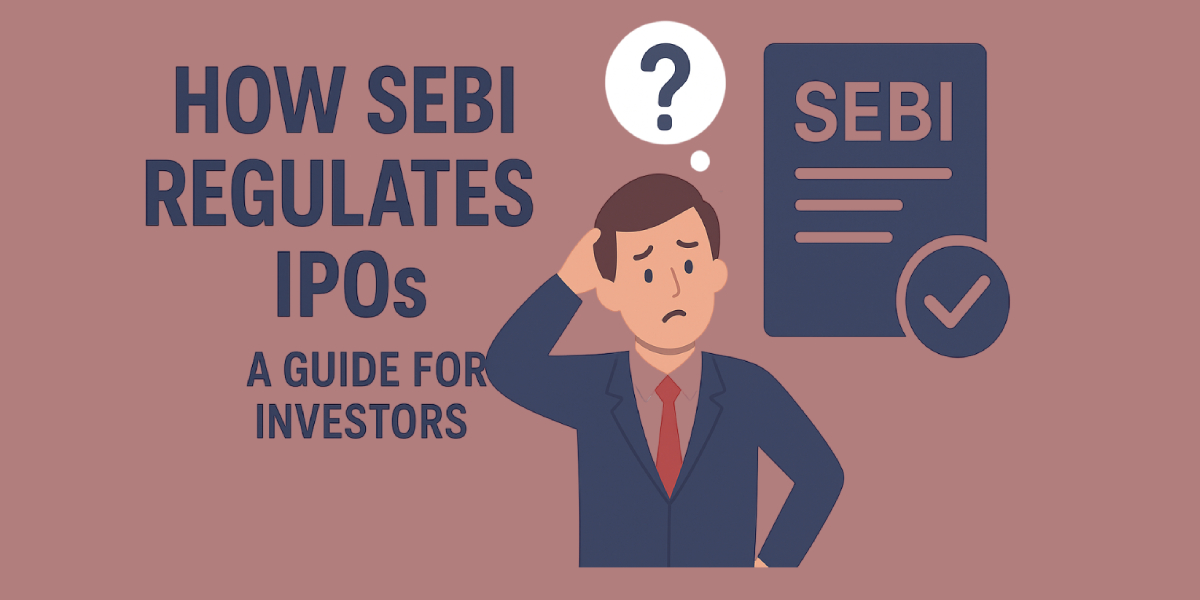IPO Basics 02 Sep 2025
The Role of SEBI in IPO Regulation: What Retail Investors Must Know
Have you ever wondered who makes sure that IPOs in India are fair, clear, and safe for investors? It's SEBI, the Securities and Exchange Board of India. IPOs can be exciting, but knowing the rules and protections behind them matters. Many retail investors focus on listing gains and miss the rules that protect them. Understanding IPO investment meaning is not just about how to buy shares; it’s also about how SEBI keeps trust in the market.
Here’s the point: when you know what SEBI does, you can make better choices, avoid common mistakes, and respond calmly to IPO recent news. With the right facts, you can approach every IPO with clarity, confidence, and a clear plan for the future.
What SEBI Actually Does
SEBI is the regulator of India’s securities market. Its role is not limited to IPOs, it also covers mutual funds, stock exchanges, and other investment products. For IPOs, SEBI:
Ensures Transparency – SEBI makes sure companies give clear, correct details in their prospectus so investors know what they are buying.
Protects Investors – Rules on allotment, subscriptions, and refunds help ensure retail investors are treated fairly.
Regulates Pricing – Guidelines aim to avoid extreme underpricing or overpricing and keep the market balanced.
Monitors Market Activity – SEBI watches for suspicious trading and stops manipulation, protecting your money.
By following these rules, SEBI helps even first-time investors to approach IPOs with confidence.
Understanding IPO Investment Meaning
At its core, IPO investment meaning is buying shares in a company when it first goes public. For retail investors, this is often their first chance to join a company's long-term growth journey. But here’s the catch: the process follows rules and regulations to keep things fair. Companies must file detailed documents with SEBI, like financial reports, risk notes, and management comments.
Knowing the meaning behind your investment helps you:
Assess whether a company's growth prospects align with your financial goals.
Understand risks before committing funds.
Interpret IPO recent news correctly, without being swayed by hype or speculation.
SEBI’s Role in IPO Documentation
One of SEBI’s main responsibilities is to make sure every IPO has the correct documents. Key elements include:
Draft Red Herring Prospectus (DRHP) – Gives early details about the company, financials, and IPO objectives.
Red Herring Prospectus (RHP) – Updated before the IPO opens, containing final information for investors.
Allotment Guidelines – SEBI regulates how shares are allocated to retail, institutional, and high-net-worth investors.
What this really means is that your rights and expectations as a retail investor are protected from the very beginning.
How SEBI Handles IPO Pricing
Pricing can make or break an IPO, and SEBI plays a key role in keeping it fair. Knowing how SEBI controls IPO pricing helps investors decide wisely and avoid paying too much for shares. SEBI makes sure:
Fair Valuation – Companies must explain their price band using financial data and current market factors.
Balanced Allotment – Retail investors get a fair portion of the issue, even when demand is high.
Market Discipline – Stops companies from boosting prices just to lure investors.
Knowing these rules helps you read IPO recent news about price bands and listing patterns more clearly.
Key Protections for Retail Investors
This is where SEBI’s role is especially helpful for small investors:
Refund Timelines – If the IPO is oversubscribed, any extra application money is returned quickly.
Transparent Allocation – Retail investors can clearly see allotment ratios.
Disclosure of Risks – Companies must point out possible problems so investors can decide safely.
By knowing these protections, you can handle IPOs with less worry and more clear strategy.
Common Misconceptions About SEBI
Many retail investors assume SEBI guarantees profits or that every IPO will be a winner. That’s not true. Here’s what you need to know:
SEBI Protects, Not Profits – It makes sure the process is fair, not that you will earn money.
Market Risks Remain – Price ups and downs, sector shifts, and company results still affect your investment.
Due Diligence Is Key – Rules offer protection, but you still must do your own research.
Timing Doesn’t Guarantee Success – Even with SEBI rules, buying on listing day doesn’t always lead to gains.
All IPOs aren’t Equal – SEBI enforces fairness, but a company’s fundamentals and market conditions decide its performance.
How Finnpick Supports Smarter IPO Investing
IPOs are easier to handle when you have trustworthy tools and clear information. Finnpick gives live updates, past performance data, and simple insights that help retail investors make better choices. Combine this information with what you know about SEBI rules, and you can plan with more confidence and lower risk.
Real-Time Tracking: Watch IPO performance on listing day so you can act fast when the market moves.
Subscription Insights: Look at trends across several IPOs to see investor interest and demand patterns.
Company Analysis: Learn a company’s basics and possible risks before you invest.
News Updates: Stay up to date with IPO recent news that could affect your plan.
Data-Driven Decisions: Use Finnpick’s tools to make clearer, more confident choices in the IPO market.
Seize Every IPO Opportunity
Knowing SEBI’s role changes how you view IPOs. It’s not only about applying for shares; it means transparency, fair pricing, and investor safety are part of the system. Using services like Finnpick with that knowledge lets you follow IPO recent news, check listing results, and study market trends, giving you a clearer sense of possible chances.
Here’s the key: knowing IPO investment meaning and regulatory safeguards turns uncertainty into an advantage, helping you navigate IPOs confidently, minimize mistakes, and identify promising investments before others even notice them. Stay updated on the latest IPO news and trends with Finnpick at your fingertips.



